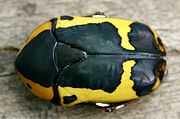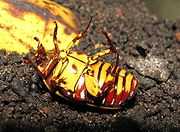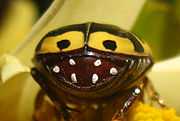Pachnoda sinuata
| Pachnoda sinuata | |
|---|---|
 | |
| Pachnoda sinuata at the Ménagerie du Jardin des plantes, Paris | |
| Scientific classification | |
| Kingdom: | Animalia |
| Phylum: | Arthropoda |
| Class: | Insecta |
| Order: | Coleoptera |
| Family: | Scarabaeidae |
| Subfamily: | Cetoniinae |
| Genus: | Pachnoda |
| Species: | P. sinuata |
| Binomial name | |
| Pachnoda sinuata (Fabricius, 1775) | |
| Synonyms | |
| |
Pachnoda sinuata, the garden fruit chafer or brown-and-yellow fruit chafer, is a species of beetle found in Namibia and South Africa.
Subspecies
- Pachnoda sinuata calceata Harold, 1878
- Pachnoda sinuata flaviventris (Gory & Percheron, 1833)
- Pachnoda sinuata machadoi Rigout, 1989
- Pachnoda sinuata nicolae Rigout, 1986
- Pachnoda sinuata sinuata (Fabricius, 1775)[1]
Identification
The species is part of the large family Scarabaeidae, which also include the scarabs and dung beetles. This species is large with a smooth carapace. Colouration is variable but basically yellow with dark brown central area broken by yellow spots and a transverse yellow line across the rear of the elytra.
Diet
Adult beetles feed on flowers and fruit, often destroying them in the process which makes them unpopular with gardeners. While commonly found on exotic plants like roses and camellias, these beetles also feed on a range of indigenous plants including Acacia.
Breeding
Adults lay their eggs in manure and compost heaps or among plant roots. The pupae develop inside large, egg-shaped protective clay shells.
Biology
This species is a popular prey species for many species of bird, such as red-winged starlings and Hadeda Ibises.
Habitat
It ranges widely in South Africa and thus are found in a variety of habitats. They are commonly found in gardens.
Gallery
-

Dorsal view
-

Ventral view
-

Pygidium, possibly showing animal mimicry
-

Larva
-

Pupa
References
| Wikimedia Commons has media related to Pachnoda sinuata. |
- Picker, Griffiths & Weaving - Field Guide to Insects of South Africa (Struik 2002) ISBN 1-77007-061-3
- Rigout (J.), 1989, The Beetles of the World, volume 9, Sciences Nat, Venette